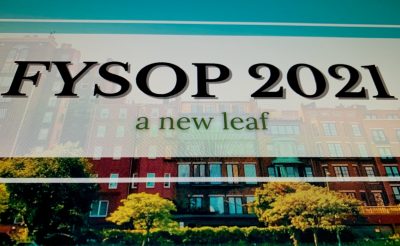I first heard about the First-Year Student Outreach Project from my Boston University tour guide when I visited the summer before my junior year of high school. She fondly described FYSOP as her favorite and most memorable experience of freshman year and highly recommended the program, saying she still gets together with her FYSOP group for monthly dinners. Her story stuck with me the entire time I was applying to BU. Once I committed, I knew I had to apply to the program.
FYSOP is a week-long program before the first day of class aimed at providing freshmen with a head-start in their transition to campus life. The program emphasizes themes of education, service and reflection through community engagement and educational activities. Throughout the week, students participate in volunteer and bonding activities with their assigned focus area group — chosen from an array of social justice topics, such as education, food justice and sustainability. The groups are led by two staff leaders who guide students from point A to point B while managing to keep the group accountable and on time.
My FYSOP experience could be summed up in one word: chaotic.
The 14-hour days were often packed to the fullest with different events. We started breakfast with our group at 7 a.m., which would typically consist of yogurt, granola bars and pieces of fruit. Not the most satisfying, but I quickly learned to pack extra snacks to eat throughout the day.
Then, we would meet with community partners in the surrounding Boston community from 9 a.m. to 5 p.m. with lunch in between. I was a member of the education focus area, meaning my service consisted of assisting local schools doing various activities, such as setting up classes for the upcoming school year, assisting teachers with organizational projects and cleaning the general building. Lunch was a turkey sandwich served with a side of chips and a cookie, and I thought it was pretty good.
Then we would head off to our only break of the day — which I used to shower — before heading to dinner at 6 p.m.. Dinner was often eaten in one of BU’s dining halls with our FYSOP group followed by a daily hour-long reflection. During reflection, we would discuss the day’s events and our thoughts about the Boston education system. Finally, we would go to nightly programming which lasted until 9:30 p.m.. Nightly programming varied depending on the day. Events included watching poets of the Boston community, dance performances, and a live drag show.
Then, we had to do it all again the next day.

FYSOP overall was incredibly rewarding but exhausting at the same time. In general, it served as an excellent distraction from my raging homesickness and anxiousness about classes starting. I was simply too tired from the day to miss my family or worry about the future. Nonetheless, my FYSOP experience would have been incredibly different had it not been for my particular FYSOP group and staff leaders.
I am incredibly grateful to say that I met my best friends so far in college from FYSOP. We’ve been inseparable ever since.
However, other people were not as fortunate as I was. Observing my peers, I noticed that my group had grown quite a unique bond in such a small amount of time. By some stroke of luck or miracle, we were placed into a group together. I had gotten what I had wished for from FYSOP with the bonus of moving in a week early, which meant I avoided the pure mayhem of the general move-in period.
Needless to say, there were a lot of highs and lows throughout the week that I glossed over as I chose to focus on the positives. There are plenty of concerns that I believe the FYSOP program managers and coordinators can improve on.
For instance, I know of others that did not connect as well with their FYSOP group and had a pretty miserable and isolating experience because of it. Possibly due to COVID-19 limiting contact or the original structure of the program, we were limited to mostly interacting within our group. People in different FYSOP groups often did not interact with one another, making it difficult to find other people to connect with.
I suggest that in the future, FYSOP groups should be able to interact with other groups during the day. In addition, small group events should be planned during nightly programming, encouraging members from different focus areas to interact with one another.
Overall, I am incredibly thankful for my FYSOP experience, and I hope I have given you a candid perspective of what it is like to take part in the program.
















































































































